Health & Environment
Keep up with our latest demographic insights
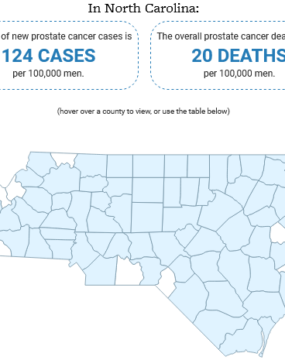
Today we are proud to launch an interactive web-based tool aimed at raising awareness and addressing disparities related to prostate cancer in North Carolina. Created in conjunction with the UNC Men's Health Program, the Prostate Cancer Across North Carolina tool provides a detailed, county-by-county map view of prostate cancer cases and deaths, offering valuable insights for local and state organizations as well as the public. "By offering detailed insights into new cases and mortality rates…
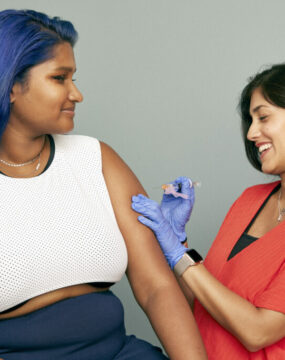
The Center for Women’s Health Research (CWHR) at the University of North Carolina School of Medicine released the 12th edition of our North Carolina Women’s Health Report Card on May 9, 2022. This document is a progress report on the health and health care needs of North Carolina’s 5+ million women. Carolina Demography collected the data found within this report. A complete list of data indicators and highlights from the report is available from CWHR.…
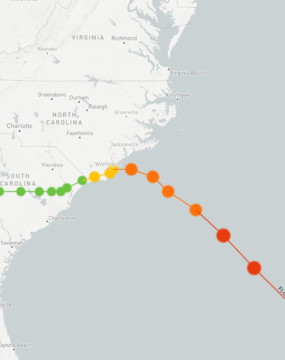
Climate change affects us all, but that impact is not spread evenly across populations. In North Carolina, we are seeing changes ranging from coast line erosion and increased frequency of powerful storms to floods, drought, and increased temperatures. Rural communities are particularly vulnerable to the effects of climate change. Small rural towns are often less resilient – meaning they don’t have the ability to withstand or recover quickly from natural disasters– than their larger, more urban…

Nationally, and in North Carolina, there was evidence of a Covid-19 “baby bust”, meaning the number of births decreased after the pandemic started in March 2020. We reached out to the State Center for Health Statistics (SCHS) for updated data. What does this new data tell us? We did see a decrease but it was smaller than expected First, the Covid-19 baby bust was real, but not as large as we initially reported. Last year,…
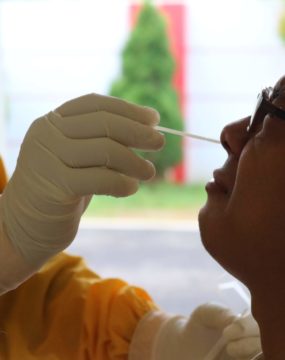
The federal government launched a new website on Wednesday to provide four free at-home COVID-19 tests for every residential address in the United States. There are many households in the United States with more than four residents living in them. Who are these households and where are they located? We also wanted to learn more about households that may need alternative ways of accessing the material – because they don’t have Internet – or that…

This story has been republished from Kaiser Health News. We have added North Carolina-specific information about vaccination rates in each county.You can read the original story here. Jessica Choi provided data specific to North Carolina for this post. KHN reporting by Rachana Pradhan and Hannah Recht January 14, 2022 Two months after Pfizer’s covid vaccine was authorized for children ages 5 to 11, just 27% have received at least one shot, according to Jan. 12…



28 million kids are now eligible to receive their Pfizer-BioNTech vaccines now that the shots are approved for 5 to 11-year-olds, according to the AP. We wanted to see how many kids in NC fall in this age group and determine where they live. Using the 2021 single age population projection data from the North Carolina Office of State Budget and Management (OSBM), we calculated the number of individuals aged 5 through 11 by county…


A growing number of Americans are teaching their children at home. According to the National Center for Education Statistics, the number of homeschooled students nearly doubled nationally from 850,000 in 1999 to 1,690,000 in 2016. The percentage of students who were homeschooled increased from 1.7 percent of all students to 3.3 percent of all students over the same time. The pandemic has dramatically increased the number of homeschooled students nationally. The U.S. Census Bureau created…
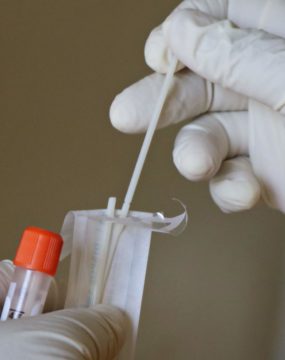

Paul Delamater, a health geographer and our colleague at the Carolina Population Center, is providing up-to-date estimates of COVID-19 cases and forecasts of vaccination across North Carolina. In addition to estimates, Delamater and a team of researchers are mapping: Schools NC COVID-19 Case Rates by School District (over the past 2 weeks) NC COVID-19 Case Rates by School District (over the past week) What CDC transmission category each school district across the state is in,…


Earlier this year, we documented what we have learned so far about the pandemic’s effect on the educational system in NC. In this post, we detail how we expect data to be impacted across the education continuum, from Pre-K to career, with specific attention to 18 education indicators we monitor through the myFutureNC state dashboard. There are four main ways data can be impacted: 1. No data updates are available COVID-19 significant disrupted data collection…
Your support is critical to our mission of measuring, understanding, and predicting population change and its impact. Donate to Carolina Demography today.